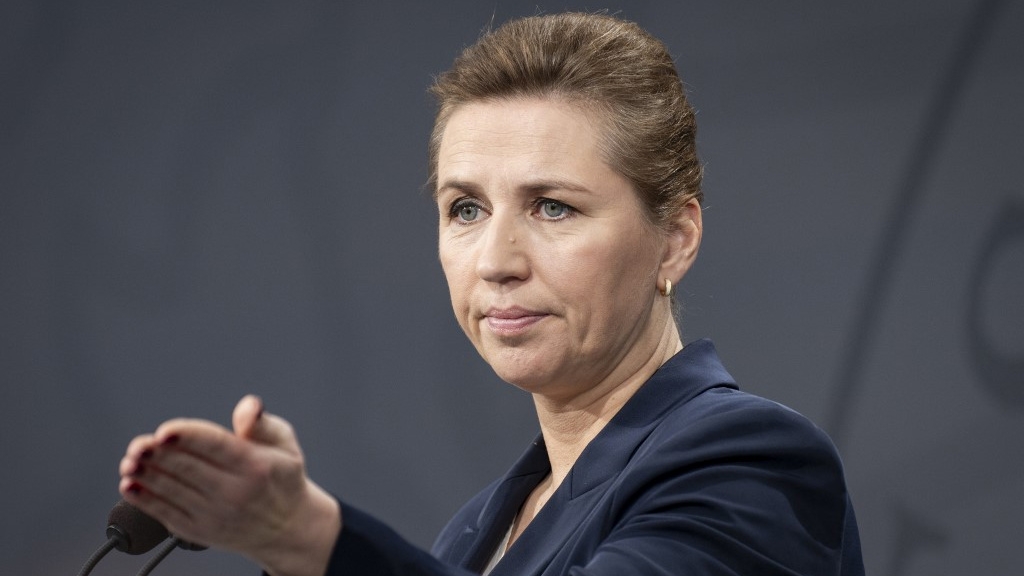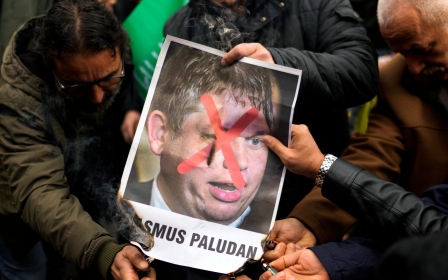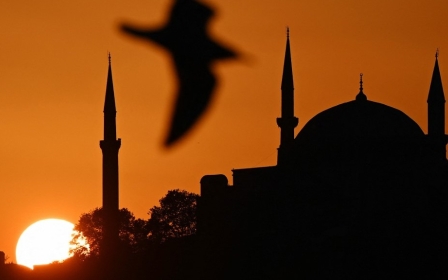How Denmark's ban on Quran burnings could be a double-edged sword

After months of passionate controversy, Denmark recently enacted a law banning "inappropriate treatment of writings with significant religious importance for a recognised religious community". Publicly tearing, burning or defiling texts such as the Quran is now punishable by a fine or up to two years in prison.
The object of a lengthy parliamentary examination and heated national debate, the bill was first proposed in August, with a goal to pass it before Christmas. Mission accomplished.
The debate had already crossed Denmark's borders and become international, gaining momentum in countries such as Sweden and reminding us that although the proposed law was often presented as antithetical to Europe's traditional liberal values, such as free speech, it was neither a novelty nor an exception.
In fact, Denmark is just the latest to join a group of 10 EU countries - including Austria, Poland, Belgium, Greece, Finland, Germany, Italy, Estonia and Romania - that have imposed various bans on the desecration of religious texts.
Prior to the legislative proposal, Denmark had witnessed a wave of public burnings of Islam's holy book, whose sacred nature and status for Muslims might seem hard to understand for non-Muslims in a northern European society that is among the most irreligious in the world.
New MEE newsletter: Jerusalem Dispatch
Sign up to get the latest insights and analysis on Israel-Palestine, alongside Turkey Unpacked and other MEE newsletters
The shock, trauma, pain, humiliation, outrage and even fright that pious Muslims can experience when they see the Quran publicly burned and desecrated, sometimes in front of their own mosques, might have no resonance in the lived experiences of most Danes.
But the ban is understandable. For months, Quran burnings in European countries have fuelled a deepening crisis with economic, diplomatic, political and security consequences, both domestic and international.
Provocative stunts
Muslim countries and their governments have forcefully condemned such provocative stunts. Ambassadors have been summoned and large crowds have expressed outrage. Several terrorist plots have been foiled, and by the end of summer, Sweden's terror alert had been raised to "high" (the fourth level on a five-level scale). Clearly, public order was under threat.
In such circumstances, Denmark's government could not stand idly by as provocateurs sowed discord and put the nation at risk, both at home and abroad. Thus, the Danish government was forced to try to strike a delicate balance between its genuine commitment to free expression, and its national security and international interests, which seem to have been the law's primary driver - ahead of considerations for the religious sensitivities of Muslims.
The ban does not signal a strong stance in defence of Islam and Muslims, or even respect for this community; nor does it inscribe itself in a policy against Islamophobia. Nowhere in the official justifications, declarations and texts can such words and motivations be found. The government is simply afraid of retaliation and blowback, amid concerns over its domestic security and foreign policy. Furthermore, the law will be reviewed in three years and may turn out to be temporary.
Supporters, mostly Muslims, welcome what they see as long-overdue protection against Islamophobic hate speech and incitement
In the meantime, there is a real risk that by trying to put out a fire, the government may ignite others. International public opinion is deeply divided between supporters and opponents of the law, and those who sit uncomfortably in the middle.
Supporters, mostly Muslims, welcome what they see as long-overdue protection against Islamophobic hate speech and incitement. They have said that free expression is invoked in cases such as these to justify Islamophobia and cloak anti-Muslim hatred in the noble rhetoric of constitutional liberties, thus turning hate speech into free speech.
They further argue that these provocations are symbolically violent acts that drive and fuel not only the rise of the far right across Europe, but Islamophobia and hatred of Muslims. When sustained over a long period of time, this represents a real danger to Muslims' physical safety and their rightful place in their own societies.
This side of the debate rightly emphasises that there is no absolute freedom of expression, even in the most advanced democracies, where fundamental civil liberties always exist within frameworks and limitations, and that free speech must be counterbalanced with other fundamental rights, such as religious freedom.
Entire categories of expression, such as racism, hate speech, slander and defamation, are typically removed from what is considered acceptable free speech, and they are usually criminalised. There is a very large consensus for this.
Safeguarding freedoms
Despite the fact that it is no stranger to attacks on civil liberties, thus leaving it open to accusations of hypocrisy, the Organisation of Islamic Cooperation (OIC) has nonetheless mounted a substantial legal argument in defence of banning Quran burnings.
The OIC emphasises that the exercise of freedom of expression entails certain duties and responsibilities according to the International Covenant on Civil and Political Rights, along with other principles enshrined in the UN Charter and other international documents, including the Universal Declaration of Human Rights. At a minimum, these arguments should be heard and more widely publicised.
The Swedish government has itself declared: "We want to safeguard the freedom of expression in Sweden. The basic principle is that it is and will remain permissible to express even such views that others perceive as offensive or insulting. This does not mean that everything is allowed. For example, rules on incitement to racial hatred set limits."
Critics and opponents argue that such prohibitions constitute terrible capitulations to foreign pressure from authoritarian and undemocratic states, such as Saudi Arabia. They argue that this represents an abdication of the right to free expression, setting a precedent that can only reward and embolden the enemies of freedom, jihadists included, and put more pressure on western states to further restrict criticism of Islam while abandoning their most cherished values.
Critics also note that the new legislation constitutes a historical regression to the blasphemy law that Denmark abolished in 2017, and a reinstatement of bigotry through the reimposition of religious norms on a whole society, including those who are not religious. It might also violate certain international covenants to which Denmark is a signatory.
The slippery slope or Pandora's box argument is often invoked out of fear that such precedents make it easier to restrict other types of free speech that are offensive to some, or risk undermining other fundamental civil liberties, including those of Muslims, in the name of respect for other groups.
Potential to backfire
Indeed, rather than fighting anti-Muslim bigotry and Islamophobia, this law may prove counterproductive in many ways, potentially harming Muslims themselves.
By restricting free speech, including the expression of hatred of or resentment against religions - to be distinguished from hatred against people, since laws are supposed to protect people but not religions, ideologies or texts - it could fuel the narrative of those on the far right who have always claimed that Islam is inherently incompatible with the values of our democratic, pluralistic societies, and that Muslims do not acknowledge these principles and thus do not belong in our "western civilisation".
Rather than countering far-right Islamophobic extremists, the law could actually serve them by seemingly confirming their 'incompatibility of Islam and the West' narrative
Rather than countering far-right Islamophobic extremists, the law could actually serve them by seemingly confirming their "incompatibility of Islam and the West" narrative.
It may even backfire on Muslims' own freedoms of expression and religion, given that much of their religious expression has already been targeted by bans under various pretexts, including maintenance of public order, itself invoked in this ban. Such measures are frequently double-edged swords.
Finally, some Muslims have argued that the Quran itself does not call to ban blasphemy, but instead advocates for continued dignity, patience and resilience in the face of adversity, humiliation and insults.
In any case, now that the law has been passed, we can observe what effects it will have in Denmark and across the rest of the western world - and whether it will ultimately help to improve relations between Muslims and those who hate Islam, including the sacred Quran.
The views expressed in this article belong to the author and do not necessarily reflect the editorial policy of Middle East Eye.
This article is available in French on Middle East Eye French edition.
Middle East Eye delivers independent and unrivalled coverage and analysis of the Middle East, North Africa and beyond. To learn more about republishing this content and the associated fees, please fill out this form. More about MEE can be found here.






